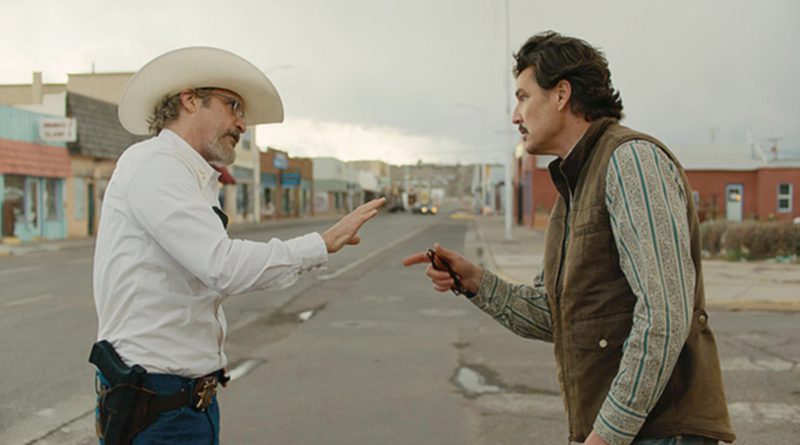Eddington Review: Ari Aster’s Otherwise Protracted Neo-Western Boasts a Few Bold and Ambitious Directions
For those who are hoping for Ari Aster to return to his elevated horror roots, here comes Eddington, marking the auteur’s continuous experimental shift into a different genre after Beau Is Afraid. This time, he explores a modern-day Western set during the early days of the COVID-19 pandemic, which takes place in the titular (fictional) small New Mexico town. The movie begins with a scene of an unkempt, bare-footed vagrant (Clifton Collins Jr.) walking in the middle of the empty road while ranting nonstop. The scene evokes the look and feel of an apocalyptic-like dread, foreshadowing that something ugly is going to happen at Eddington.
The COVID-19 pandemic was indeed a trying time that affected everyone both mentally and emotionally. It’s like the world has fully gone mad, reflecting the sight of an unhinged vagrant shown in this movie. But that madness in Aster’s world takes a slow-burn approach. An agonisingly slow-burn, to be exact, as over the first hour of Eddington is a test of patience. The kind of long-winded stretch that some of you might wonder if Aster has gone too far with his unhurried way of building up the tension.
The story focuses on the bitter rivalry between Sheriff Joe Cross (Joaquin Phoenix) and the town’s mayor, Ted Garcia (Pedro Pascal). They have a past that involves Joe’s estranged wife, Louise (Emma Stone). Ted’s the one who issued a mandate about everyone required to put on their masks when they are in the public area — a must-follow rule that doesn’t sit well with someone asthmatic like Joe, who claims that masking up makes it harder to breathe. Not to mention, he finds out that no one has ever caught up with the virus.
Early in the movie, I enjoy the part where Joe helps an elderly man, who is denied entry into a grocery store for not putting on a mask, by getting him the groceries, leading to a spat with Ted. Their contrasting viewpoint about how they handle the pandemic situation differently — Joe’s an anti of everything related to the strict COVID-19 regulations imposed by the government, while Ted is more of a by-the-book mayor — should have been an intriguing story to follow through.
Except that Aster wants to shove too many things at once. Like how the pandemic has divided the people while suffering from social anxieties and paranoia. Or getting too attached to the habit of doom-scrolling, surrounding the endless conspiracy theories that spread all over social media. There’s even a story addressing the street protest against the death of George Floyd caused by police brutality and racism, which triggered the Black Lives Matter movement.
Aster also throws in a few subplots from Joe and Louise’s increasingly fractured relationship, leading to the latter’s decision to fall with the charming cult leader played by Austin Butler, to Ted dealing with his rebellious teenage son, Eric (Matt Gomez Hidaka). These multiple subplots are more of a narrative burden that leaves the story seemingly wandering in circles with little progress. I have to admit it was a chore to sit through the first act that goes on like forever.
But just as I figure Aster is heading to the biggest colossal misfire of his otherwise illustrious career, he manages to find the right footing in the second half. It’s like a sudden wake-up call jolt to life after a period of on-and-off slumberland. Let’s just say the tension escalates once Joe’s plan against Ted during his run for mayor hits a stumbling block. The movie’s otherwise quaint small town soon turns into the bowels of darkness filled with violence and body count.
Shocking moments follow as we watch Joe’s descent into madness and desperation begin to consume him inside out, which stems from his troubled marriage and his frustrating plight over his career shift. Aster even pushes further in the third act, leading to a thrilling High Noon-like showdown, where all hell breaks loose. Phoenix, who reunites with Aster again after Beau Is Afraid, excels in a role that may seem tedious at first, but his character arc gets progressively interesting, especially when things start to fall apart, which ultimately changes his perception.
The movie equally benefits from stellar supporting roles, including Pedro Pascal and Emma Stone. On the technical fronts, credits go to Darius Khondji’s atmospheric cinematography, particularly the way he turns the sleepy small town into a dread-inducing landscape in the third act. Eddington‘s 148-minute runtime, in the meantime, could have used a serious trimming.





